A day before Chinese military began pulling back from Galwan Valley in eastern Ladakh, National Security Advisor Ajit Doval and Chinese Foreign Minister Wang Yi agreed on an expeditious withdrawal of troops, holding that a complete disengagement at the "earliest" was necessary for full restoration of peace in border areas and both sides should not allow differences to become disputes.
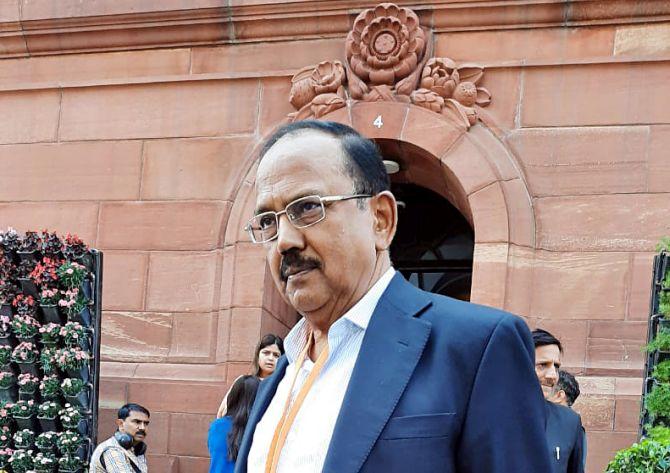
Doval and Wang, who are special representatives for boundary talks between the two countries, held a telephonic conversation on Sunday during which they had a "frank and in-depth exchange" of views on the recent developments in the western sector, the ministry of external affairs said on Monday.
Significantly, Chinese troops began removing tents early on Monday and started to withdraw from Galwan Valley, the site of a violent hand-to-hand clash between the two militaries on June 15 that left 20 Indian soldiers dead, government sources said.
Rearward movement of vehicles and troops was seen in Gogra Hot Springs as well but there was no confirmation of similar disengagement in Pangong Tso area, said the sources.
They said Chinese troops moved back around one kilometre from patrolling point 14, 15 and 17 in Galwan Valley.
In the talks, Doval and Wang re-affirmed that both sides should "strictly respect" and observe the Line of Actual Control and should not take any unilateral action to alter the status quo, the MEA said.
The two special representatives agreed to continue their conversations to ensure "full and enduring restoration" of peace and tranquillity in the India-China border areas.
It was the first time that Doval and Wang held talks during the ongoing stand-off.
Government sources said India is strictly monitoring whether China was withdrawing its troops from friction points, adding global support to New Delhi and Prime Minister Narendra Modi's strong message during his visit to Ladakh last week may have had some impact on Beijing agreeing to move back its army.
The MEA said it was agreed to "take guidance from the consensus of leaders" that maintenance of peace and tranquillity in border areas was essential for the further development of bilateral ties and that two sides should not allow differences to become disputes.
"Therefore, they agreed that it was necessary to ensure at the earliest complete disengagement of the troops along the LAC and de-escalation from India-China border areas for full restoration of peace and tranquillity," it said.
"In this regard they further agreed that both sides should complete the ongoing disengagement process along the LAC expeditiously. The two sides should also ensure a phased and stepwise de-escalation in the India-China border areas," the MEA added.
It was re-affirmed that both sides should "strictly respect and observe" the LAC and should not take any unilateral action to alter the status quo, besides working together to avoid any incident in the future that could disturb peace and tranquillity in border areas.
The MEA said the two special representatives agreed that the diplomatic and military officials should continue their discussions, including under the framework of the Working Mechanism for Consultation and Coordination on India-China border affairs, and implement the understandings reached in a timely manner.
"It was also agreed that the two special representatives will continue their conversations to ensure full and enduring restoration of peace and tranquillity in the India-China border areas in accordance with the bilateral agreements and protocols," the MEA said.
The Indian and Chinese armies are locked in a bitter standoff in multiple locations in eastern Ladakh for the last eight weeks. The tension escalated manifold after killing of 20 Indian soldiers in Galwan Valley. The Chinese side also suffered casualties but it is yet to give out the details.
Both sides have held several rounds of diplomatic and military talks in the last few weeks to ease tension in the region. However, there was no visible sign of any end to the standoff.
On June 30, the Indian and Chinese armies held the third round of Lt General-level talks during which both sides agreed on an "expeditious, phased and step wise" de-escalation as a "priority" to end the standoff.
The first round of the Lt General talks were held on June 6 during which both sides finalised an agreement to disengage gradually from all the standoff points beginning with Galwan Valley.
However, the situation deteriorated following the Galwan Valley clashes as the two sides significantly bolstered their deployments in most areas along the LAC.
On Friday, Modi made a surprise visit to Ladakh during which he said the era of expansionism is over and that the history is proof that "expansionists" have either lost or perished, in comments which were seen as a clear message to China that India is not going to backoff and would deal with the situation with a firm hand.
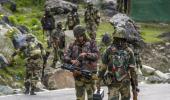
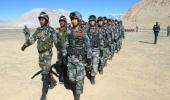
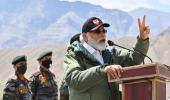
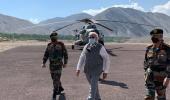







 © 2025
© 2025